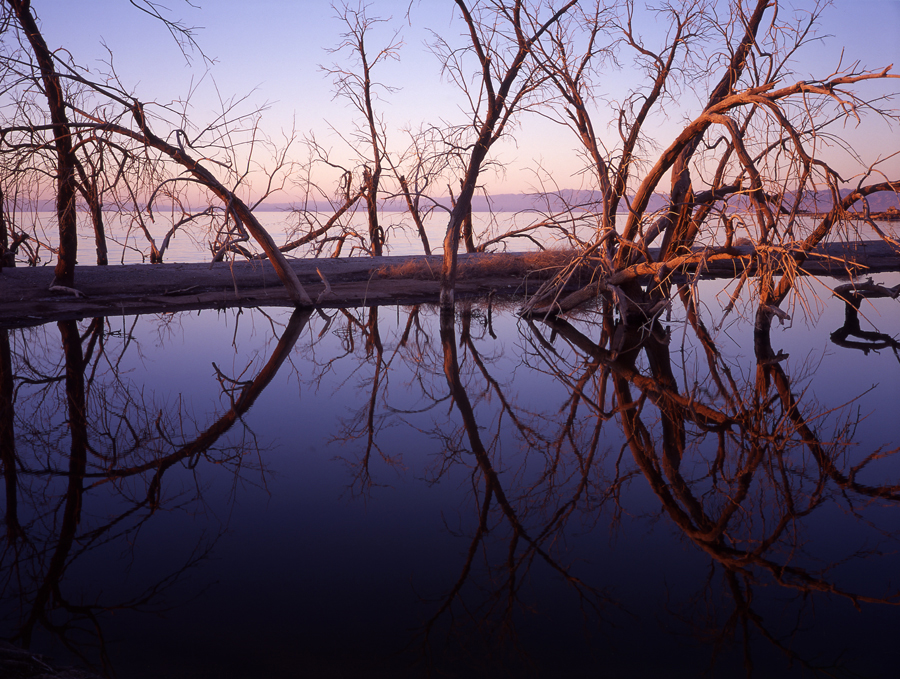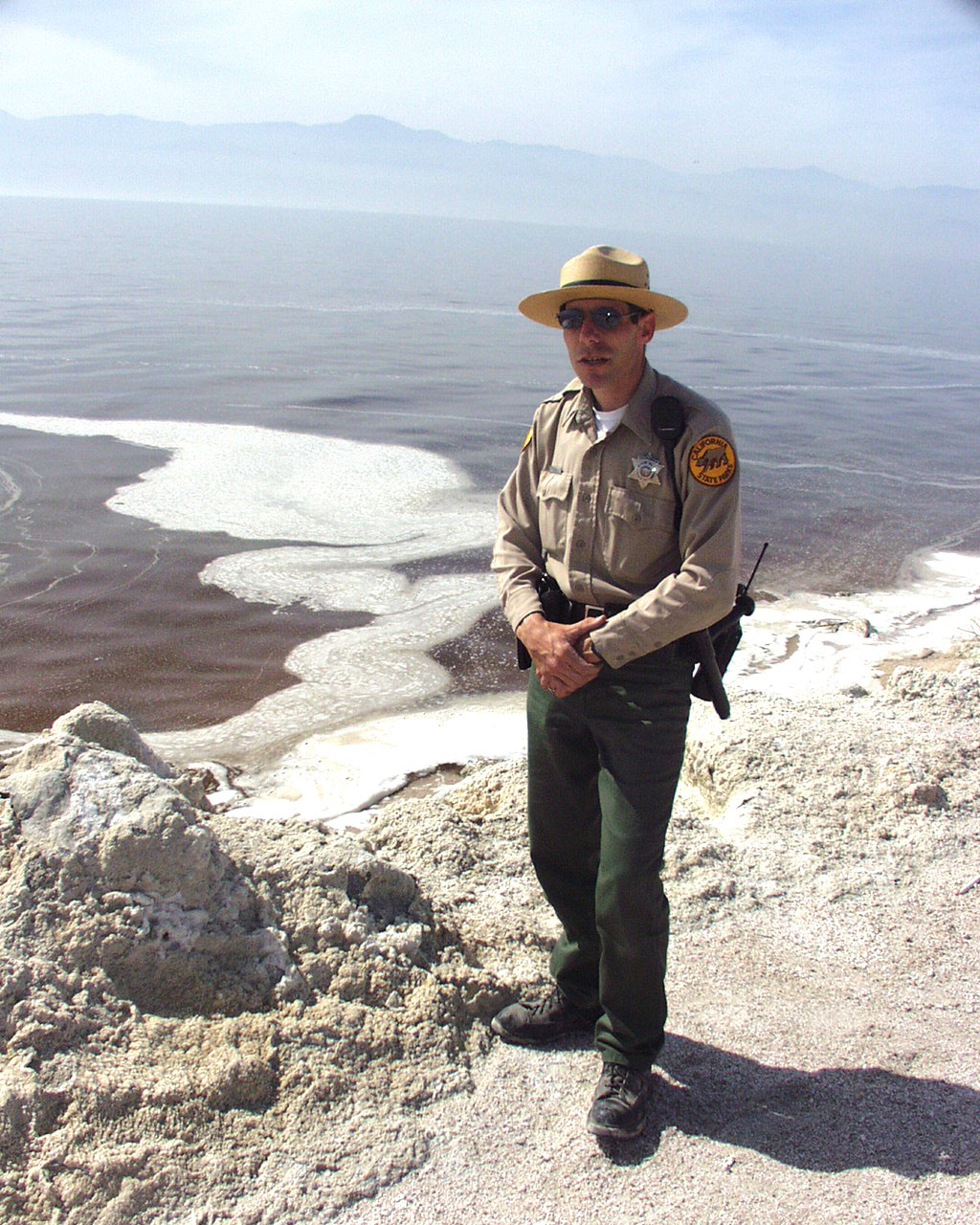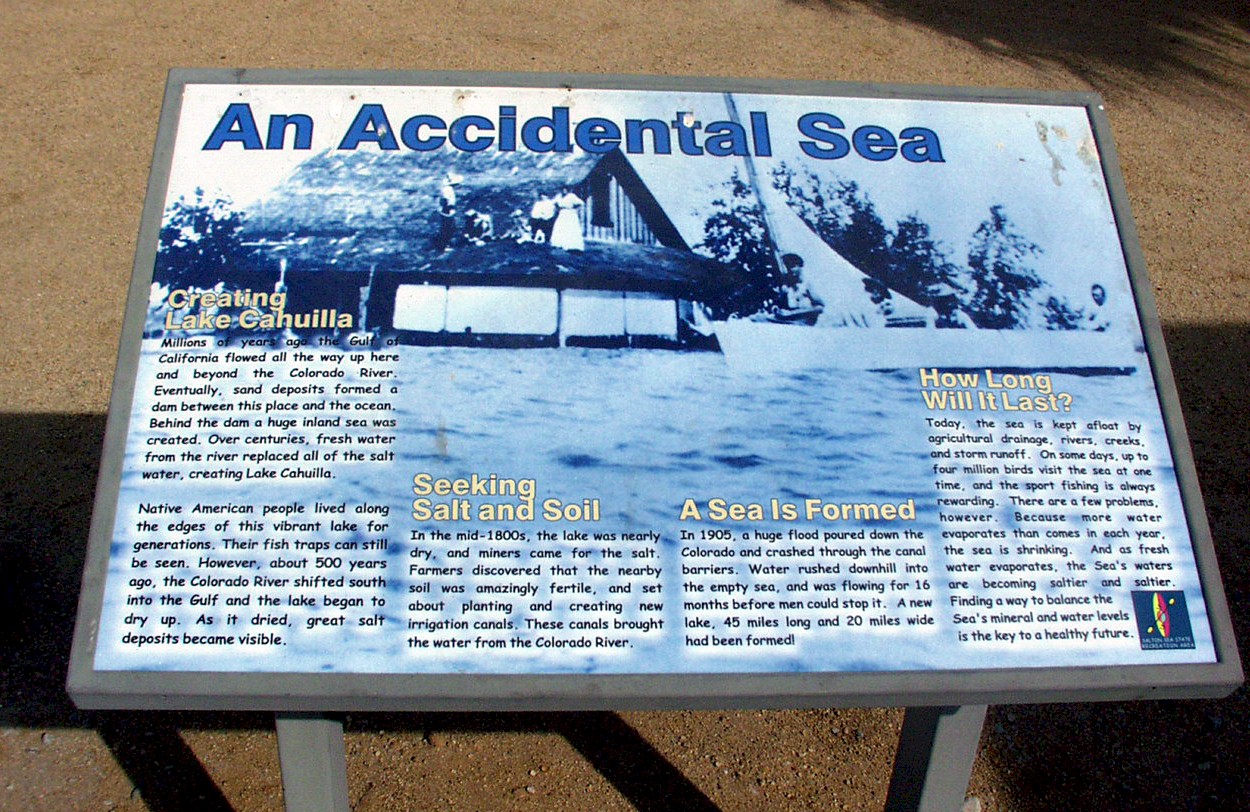|
By Donald H. Harrison
SALTON SEA, Calif.— The inland Salton Sea certainly is no Dead Sea
but unless care is taken to deal with its increasing salinity, it could become
The Very Sick Sea.
The problem is that the 35-by-15 mile Salton Sea is becoming increasingly
salty as the result of diminishing supplies of water from three local rivers
and the runoff from agricultural fields served by the All-American Canal.
In a way, says California Park Ranger Steven Bier, the problem is not unlike
that of the Dead Sea, which is experiencing reduced inflow from the Jordan
River.

Michael Field of the San Diego Museum of Natural
History made this photograph in 2001 of a dead tree along
the shore of the Salton Sea. The sea could also die if the problem
of increasing salinity is not addressed.
One of the proposed save-the-sea solutions for the Salton Sea is reminiscent
of one that has long been discussed in Israel. Those who have urged a "Red
to Dead" canal to carry water from the Red Sea to the Dead Sea would recognize
the logic behind a proposal to lay pipelines between the Salton Sea and the
Sea of Cortez for exchanges of water.
As a Red to Dead Canal would require close cooperation between neighbors
Israel and Jordan which face each other across the Dead Sea, as well as with
the nearby Palestinian Authority, so too would a Salton-to-Cortez pipeline
require close cooperation between the United States and Mexico.
To access the Sea of Cortez, also known as the Gulf of California, a pipeline
would have to cross Mexican territory. This proposal is no longer considered
viable--not only because it would provide far more benefits to the United
States than to Mexico, thus offering the latter little incentive to go along
with it--but also because its cost would run into the billions of dollars.
Other suggestions have included huge desalinization plants, which again
have prohibitive price tags, and dividing the Salton Sea into northern and
southern parts, with the northern part to be retained as a body of water
and the southern portion perhaps transformed into a series of settling ponds.
Rock legend Sonny Bono, the former husband and musical partner of Cher,
helped to draw national attention to the problems of the Salton Sea after
he was elected to Congress. Subsequently killed in a 1998 skiing accident,
he was succeeded in Congress by his wife, Mary Bono, who has continued the
quest for a solution.
Bier said that the Salton Sea was considered an "inland Riviera" by the
Hollywood crowd, with such stars as Humphrey Bogart and the Marx Brothers
keeping and racing boats here. But the "petri dish" environment of the Salton
Sea sometimes results in large kills of fish and birds, reducing the water
body's popularity. Once there was a time when the Salton Sea was covered
with boats every weekend, and some popular spots along its shore seemed to
be wall to wall with fishermen, said the ranger.
Yesterday, with temperatures quite moderate, the Salton
Sea would have seemed a perfect place for a weekend getaway, but the vast
parking lot in front of the Visitor's Center was nearly deserted-- the result
not only of the virtual disappearance of such popular sports fish as the
sargo and the orange mouth corvina, but also because in recent years the
Salton Sea has suffered what Bier believes are undeserved public relations
problems. According to the critics, the Salton Sea is overloaded with pesticides,
sewage and selenium--all "myths" according to Bier.
 
Ranger Steven Bier on shore of Salton Sea.
A plaque explains the Sea's origins and problems. Please click
on the plaque photo for an enlarged view. (Donald H. Harrison
photos)
The Salton Sea occasionally burps gasses that smell like rotten eggs--a
natural phenomenon that further complicates the California Park Service's
efforts to counter rumors of unhealthful conditions. Undeterred, Bier and
his colleagues offer rebuttals. "Elevated levels of pesticides have been
found in the inflows to the Sea, but are not at significant levels in the
Sea," according to an official statement. "In fact, while pesticides have
been known to kill a couple of birds every year on agricultural fields, not
a single bird is known to have died from pesticides at the Sea itself."
As for sewage flowing from Mexico into the New River,
the California Park Service responds that only 12 percent of the Salton Sea's
waters originate in the New River. It adds:: "By the time water containing
human and industrial wastes crosses the border and traverses the 60 miles
to its delta at the Sea, the New River's water quality is nearly equivalent
to that of the nearby Alamo River's. Waste from Mexico undergoes natural
treatment in the River and is diluted by agricultural drain water from the
Imperial Valley. Additionally a wastewater treatment plant is being constructed
in Mexicali to improve water quality in the New River."
Concerning selenium, The California Park Service says, "Selenium is not found
in the waters of the Sea at levels above safety standards, despite elevated
counts in the rivers entering the sea. In fact, there is less selenium in
the water of the Salton Sea than in San Francisco's drinking water. Selenium
has been identified at slightly elevated levels in the sediments of the deepest
parts of the Sea. At these deep levels, it is not available to the food
chain." However, the Park Service notes, "selenium can become concentrated
in the food chain, and some studies have found elevated levels in fish. While
selenium at low levels is essential for health, too much can have adverse
effects. As a result, an advisory has been issued warning against eating
fish from the Sea more than once every two weeks."
These controversies, according to Bier, divert attention
from the major problem facing the Salton Sea--its increasing hyper-salinity.
Currently the Sea's salt content is 47 parts per thousand, compared to only
32 parts per thousand in the Pacific Ocean. Still, that is but a pittance
of salt compared to an estimated 333 parts per thousand in the Dead Sea,
where no species live, except perhaps for the tourists who are delighted
by the fact that they can actually sit on its salt-heavy waters without sinking.
At the Salton Sea, some fish may periodically die off, but others thrive,
including tilapia, which are estimated to number over 200 million this year,
according to Bier. The many nutrients that flow into the Salton Sea support
microorganisms, which in turn provide sustenance to macro-organisms. These
are fed upon by fish, which attract millions of migratory birds Besides
brown pelicans, white pelicans and sea gulls, birds likely to be spotted
without too much difficulty at the Salton Sea include eared grebes, burrowing
owls, great blue herons, and ospreys. Approximately 400 species have been
documented by local bird watchers.
The scarcity of water and affordable housing in California add to the litany
of the Salton Sea's problems, according to Bier. Less runoff from agricultural
fields is likely as farms are sold for real estate developments near the
Salton Sea, or as farmers turn to less water-intensive crops and sell off
the balance of their water rights. Residents of the new housing developments
require their own allotments of fresh water. On the other hand, suggests
Bier, having more people living near the Salton Sea may draw more attention
to its problems. Located in the sparsely populated eastern portion of Riverside
County, the Salton Sea does not command as much attention as the coastal
resources near where many environmentalists live.
Although Bier has not yet visited the Dead Sea, he says the land of Israel
is part of his background. His maternal grandfather immigrated to the United
States from Poland, via Mandatory Palestine, where he performed as part
of a traveling theater company. Bier grew up in California's wine country
north of San Francisco, where his Jewish mother and Christian father taught
him a love of camping and nature. He has worked nearly four years for the
California Parks Service, breaking in at a nearby park for off-road vehicles
and moving over to the Salton Sea about a year ago.
|

